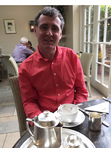A Portrait of the Artist as a Young Man by James Joyce – A Review Lacking Conviction

Published in 1916, A Portrait of the Artist as a Young Man is a semi-autobiographical novel by James Joyce, charting the development of Stephen Daedalus, an able and artistic boy living in early twentieth century Ireland.
Change in the boy’s life mirrors change in the wider world. First we see Stephen as a young child at home with his well-to-do parents, confused at the Christmas dinner table, as family and friends argue about religion and Irish nationalism. Stephen then has a Catholic schooling, where graphic descriptions of hell leave him terrified that his adolescent sexual adventures will consign him to an eternity of fiery punishment. He decides to follow Church rules to the letter, only to grow out of his religious phase, and begin studying science in Dublin. Growing out of science, he has lots of intellectual conversations with other students about definitions of beauty, and decides at the end of the book to leave Ireland and become a poet.
This individual path reflects the world generally, as society moves from faith in religious certainties, to confidence in science, to a modern situation where people are just not so sure of anything anymore.
Does all this make for a good book? Some people think it does. Others disagree, which is quite fitting really.
Personally, I found the book more interesting than enjoyable. During Stephen’s religious period, descriptions of hell’s trials went on for so long, I skimmed a few torments. Sometimes I found Stephen’s intellectual conversations tiresome – a youngster showing off. The portrayal of a student who likes the sound of their own voice was clearly intended – more down to earth fellow students puncturing Steven’s pomposities – but that didn’t make these sections any less wearying to read.
That all said, there were things I enjoyed and admired about the book. Some of the poetic prose was lovely – like memorable lines describing swallows forever working in the eaves of houses to make temporary nests. I was also fascinated by reflections on nationalism. People were busy seeking out clear national identities during Stephen’s young lifetime, maybe as a reaction to a growing loss of religious identity, which had given succour and a sense of belonging for millennia. As an Irish boy, Stephen remarks on expressing himself in English – a language not his own. But like his student mates, he often throws in bits of Latin to conversations, the language of the Roman Catholic Church. This quietly tells us that English people don’t speak a language of their own either. English, like nearly every European language, has a great debt to the ancient language of Italy. For all the sound and fury they generate, national certainties are as shaky as any other. And maybe that’s no bad thing, since rampant nationalism was a major factor in the world war raging as Portrait was published. Loss of dogmatism can make us safer rather than more vulnerable. As Joyce says in one of his most famous poems, ‘the best lack all conviction, while the worst are full of passionate intensity’.
So, I can see why some readers gave this book five stars. I also sympathise with those who gave one. On a purely personal level I’m somewhere in the middle. I think James Joyce would think this a perfectly acceptable place to be



